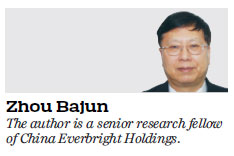'One Country, Two Systems' - three misunderstandings
Updated: 2017-04-20 07:03
By Zhou Bajun(HK Edition)
|
|||||||
Zhou Bajun writes that mistakenly interpreting the SAR's innovative founding principle as a reason to leave all systems unchanged has created a multitude of problems
President Xi Jinping met with Carrie Lam Cheng Yuet-ngor in Beijing on April 11 after she was appointed Chief Executive of the Hong Kong Special Administrative Region and the fifth term of its government. In their meeting Xi described implementation of "One Country, Two Systems" in the HKSAR since the handover as "a great success", adding that the SAR's system - enshrined in Hong Kong's Basic Law as well as the nation's Constitution - has proved effective, as evidenced in Hong Kong's overall stability and prosperity, with high accolades by the international community to boot. Meanwhile the HKSAR must keep exploring and progressing in its groundbreaking effort to implement "One Country, Two Systems".
Two phrases stand out in Xi's comment above. One is "proved a great success" and the other "keep exploring and progressing". The former is qualification and the latter expectation.
There is no denying that some Hong Kong residents and certain people elsewhere hold negative opinions about implementation of "One Country, Two Systems" in Hong Kong, because of political bias and inability to recognize reality. As a result they have mistaken three important matters for something else.

Firstly, they have confused "One Country, Two Systems" as a system design with its actual implementation.
As a system design established in the Basic Law, "One Country, Two Systems" - along with "Hong Kong people governing Hong Kong" and a high degree of autonomy - aims to facilitate the smooth transfer of the sovereign rule over Hong Kong from the United Kingdom to China without changing the existing political system. Its actual implementation since the handover in 1997 has been generally effective but not without increasingly abusive disruption and obstruction by the opposition camp. The reason why can be traced back to a last-minute rush by London to introduce representative democracy in Hong Kong as a way to cultivate loyalist forces friendly to the West in post-handover Hong Kong in the name of "giving the governing power back to the people". Also responsible for the political problems in the past 20 years is Washington, whose expanding infiltration in Hong Kong since before the handover, as an integral part of its Asia-Pacific strategy, gave rise to most if not all anti-China undertakings.
Secondly, they have managed to misconstrue the promise that "Hong Kong's capitalist social system and lifestyle will remain unchanged for 50 years" as denying the need to move with the times.
Some people thought the "unchanged for 50 years" clause in the Basic Law referred to how Hong Kong was till June 30, 1997 and therefore see the changes in Hong Kong since then as incongruous to "One Country, Two Systems". Such views are comparable to expecting the scenery to remain unchanged as one travels from Hong Kong to Beijing.
It is completely unreasonable to expect central government leaders to foresee what would happen after the handover when they designed "One Country, Two Systems" back in the late 1970s and early 1980s. For example, no one could have anticipated Hong Kong's economic integration with the mainland would happen so quickly, or the Closer Economic Partnership Arrangement (CEPA) signed in 2003 for that matter. The fact is both happened because Hong Kong needed them.
Hong Kong was all about "Two Systems", in preference to "One Country", in the first five years after the handover. Then the mainstream popular wish responded positively to the need for economic integration with the mainland, which led to the acceptance of "One Country" in economic affairs and "Two Systems" in politics.
Since mid-2003, when CEPA was born, more than 10 years of economic integration gave Hong Kong more space to grow while political tension also worsened between interest groups who believed they represented clashes between "Two Systems". It is fair to say the implementation of "One Country, Two Systems" did not find the right groove until quite recently, as the past 15 years or so was spent on shifting from emphasizing "Two Systems" over "One Country" to accepting "One Country" for the economy and "Two Systems" in politics. In order for it to advance with the times Hong Kong's next goal in implementing "One Country, Two Systems" should be preventing political differences from obstructing economic integration.
Thirdly, they have misinterpreted "One Country, Two Systems" as in conflict with traditional core values.
People of such views seem to believe "keeping Hong Kong's capitalist system and lifestyle unchanged for 50 years" means stopping the clock at the stroke of midnight on June 30, 1997. This includes the core values introduced from the West. Many Hong Kong residents were convinced holding on to the traditional core values introduced by the British Hong Kong authorities is crucial to the implementation of "One Country, Two Systems", without realizing it is a misunderstanding, or even a lie. And they were unaware that one essential "value" is missing: the historical fact that Hong Kong is an inseparable part of China. That is why it was so easy for them to ignore and even dislike "One Country".
Those are the three critical mistakes in understanding "One Country, Two Systems" and must be cleared up in order to implement the innovative policy fully and correctly.
(HK Edition 04/20/2017 page7)